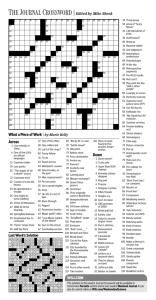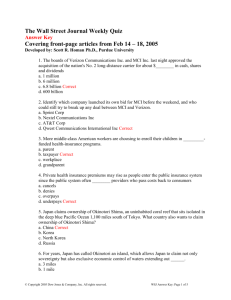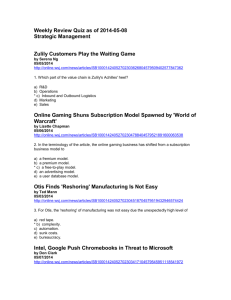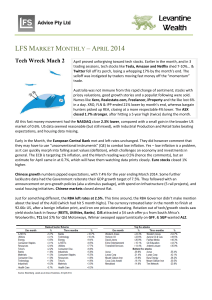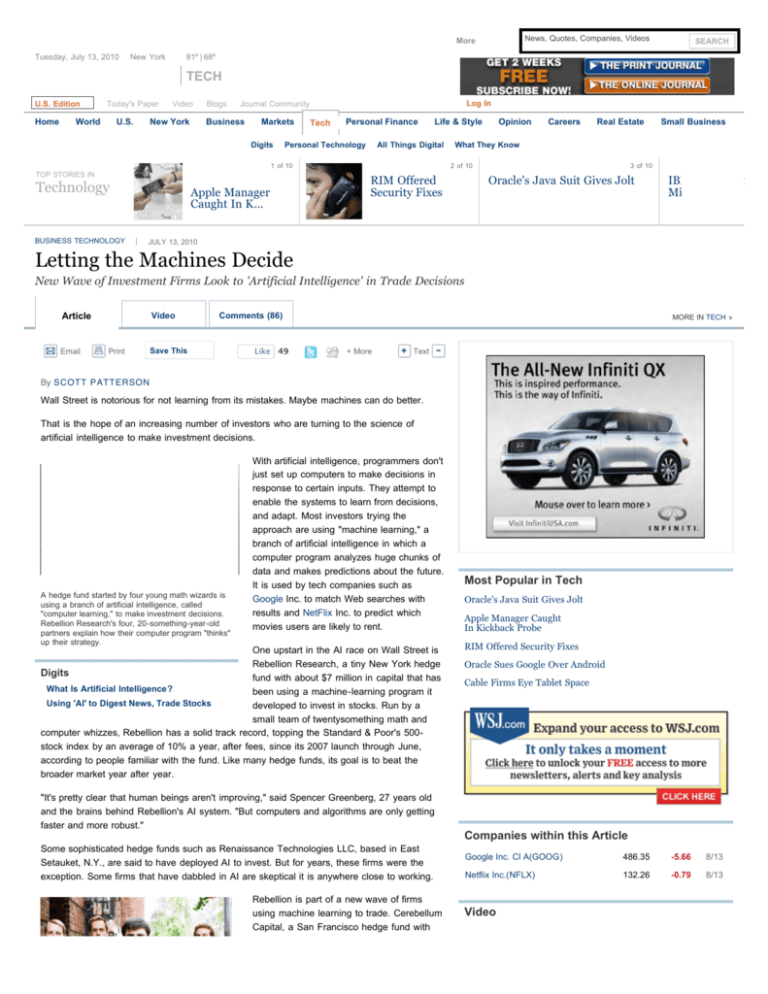
News, Quotes, Companies, Videos
More
Tuesday, July 13, 2010
New York
SEARCH
81º | 68º
TECH
U.S. Edition
Home
Today's Paper
World
U.S.
Video
New York
Blogs
Log In
Journal Community
Business
Markets
Digits
Tech
Personal Finance
Personal Technology
Life & Style
All Things Digital
1 of 10
TOP STORIES IN
Technology
BUSINESS TECHNOLOGY
Apple Manager
Caught In K...
Opinion
Careers
Real Estate
Small Business
What They Know
2 of 10
RIM Offered
Security Fixes
3 of 10
Oracle's Java Suit Gives Jolt
IBM to Buy Unica f
Million
JULY 13, 2010
Letting the Machines Decide
New Wave of Investment Firms Look to 'Artificial Intelligence' in Trade Decisions
Video
Article
Email
Print
Comments (86)
Save This
Like 49
MORE IN TECH »
+ More
Text
By SCOTT PATTERSON
Wall Street is notorious for not learning from its mistakes. Maybe machines can do better.
That is the hope of an increasing number of investors who are turning to the science of
artificial intelligence to make investment decisions.
A hedge fund started by four young math wizards is
using a branch of artificial intelligence, called
"computer learning," to make investment decisions.
Rebellion Research's four, 20-something-year-old
partners explain how their computer program "thinks"
up their strategy.
With artificial intelligence, programmers don't
just set up computers to make decisions in
response to certain inputs. They attempt to
enable the systems to learn from decisions,
and adapt. Most investors trying the
approach are using "machine learning," a
branch of artificial intelligence in which a
computer program analyzes huge chunks of
data and makes predictions about the future.
It is used by tech companies such as
Google Inc. to match Web searches with
results and NetFlix Inc. to predict which
movies users are likely to rent.
One upstart in the AI race on Wall Street is
Rebellion Research, a tiny New York hedge
Digits
fund with about $7 million in capital that has
What Is Artificial Intelligence?
been using a machine-learning program it
Using 'AI' to Digest News, Trade Stocks
developed to invest in stocks. Run by a
small team of twentysomething math and
computer whizzes, Rebellion has a solid track record, topping the Standard & Poor's 500stock index by an average of 10% a year, after fees, since its 2007 launch through June,
according to people familiar with the fund. Like many hedge funds, its goal is to beat the
broader market year after year.
"It's pretty clear that human beings aren't improving," said Spencer Greenberg, 27 years old
and the brains behind Rebellion's AI system. "But computers and algorithms are only getting
faster and more robust."
Some sophisticated hedge funds such as Renaissance Technologies LLC, based in East
Setauket, N.Y., are said to have deployed AI to invest. But for years, these firms were the
exception. Some firms that have dabbled in AI are skeptical it is anywhere close to working.
Rebellion is part of a new wave of firms
using machine learning to trade. Cerebellum
Capital, a San Francisco hedge fund with
Most Popular in Tech
Oracle's Java Suit Gives Jolt
Apple Manager Caught
In Kickback Probe
RIM Offered Security Fixes
Oracle Sues Google Over Android
Cable Firms Eye Tablet Space
Companies within this Article
Google Inc. Cl A(GOOG)
486.35
-5.66
8/13
Netflix Inc.(NFLX)
132.26
-0.79
8/13
Video
View Full Image
Michael Rubenstein for The Wall Street Journal
'Human beings aren't improving,' says Rebellion
Research's Spencer Greenberg, foreground. With
him, from left, are Jeremy Newton, Jonathan Sturges
and Alexander Fleiss, also of Rebellion Research,
outside the company's New York offices last month.
$10 million in assets, started using machine
learning to invest in 2009. A number of highfrequency trading firms, such as RGM
Advisors LLC in Austin, Texas, and Getco
LLC in Chicago, are using machine learning
to help their computer systems trade in and
out of stocks efficiently, according to people
familiar with the firms.
The programs are effective, advocates say,
because they can crunch huge amounts of
data in short periods, "learn" what works,
and adjust their strategies on the fly. In
contrast, the typical quantitative approach may employ a single strategy or even a
combination of strategies at once, but may not move between them or modify them based on
what the program determines works best.
"No human could do this," said Michael Kearns, a computer-science professor at the
University of Pennsylvania who has used AI to invest at firms such as Lehman Brothers
Holdings Inc. "Your head would blow off."
Rebellion has struggled to raise money, in part because investors since the credit crisis are
dubious of opaque math-based strategies.
The firm has attracted at least one long-time
"quant" skeptic: famed value investor JeanMarie Eveillard, who recently invested
several hundred thousand dollars of his own
money into Rebellion. "My cup of tea is not
quantitative investing," he said. "But I think
they are serious investors, and I'm
impressed by the fact that they don't have a
high turnover…and don't use leverage."
View Full Image
Michael Rubenstein for The Wall Street Journal
From left, Rebellion Research's Alexander Fleiss,
Jeremy Newton, Jonathan Sturges and Spencer
Greenberg on a recent day.
Journal Community
“
DISCUSS
Trading is a zero sum game.
Even if the computers are
trading against computers
money will still be made
because everyone's model is
different.
”
Rebellion's Mr. Greenberg is no stranger to
the investing world. His father, Glenn
Greenberg, is an iconoclastic value investor
and manager of Brave Warrior Advisors, who
recently split from his partners at Chieftain
Capital Management Inc. His grandfather,
legendary baseball slugger "Hammerin'
Hank" Greenberg, played for the Detroit
Tigers in the 1930s and '40s.
Past success doesn't mean Rebellion will
continue to beat the market. As with many
quant strategies, its system could stop
working if market fundamentals change in
ways that trip up its computer program,
known as "Star."
What makes Star intelligent, says Mr.
Greenberg, is its ability to adjust its strategy
based on shifting dynamics in the market and broader economy. The program isn't wed to any
single investing approach. Under certain conditions, the fund will buy cheap stocks, in others
it will favor stocks with swiftly rising prices—or both at the same time.
—Setsuna Seiei
Unlike the high-frequency funds that use artificial intelligence to aid rapid trading, Rebellion
tends to hold stocks for long periods—on average four months but in some instances more
than two years. It also doesn't short stocks or use leverage, or borrowed money, which can
amplify returns but also boost risks.
The program monitors about 30 factors that can affect a stock's performance, such as priceto-earnings ratios or interest rates.
The program regularly crunches more than a decade of historical market data and the latest
market action to size up whether to buy or sell a stock. When certain strategies stop working,
the program automatically incorporates that information, "learns," and adjusts the portfolio.
For instance, it may detect data indicating stocks with low price-to-earning ratios are likely to
EA to Launch
Revolution
Taliban Video Game Investing: The End
4:24
of Net Neutrality
3:40
digits: More TV and
Movies Coming to
Tablets
3:38
More in Tech
Apple Manager Caught
In Kickback Probe
RIM Offered Security Fixes
Oracle's Java Suit Gives Jolt
IBM to Buy Unica for $480 Million
Comverse Warns of Dwindling Cash
Most Popular
Read
1.
2.
Emailed
Video
Commented
Searches
'Hindenburg Omen' Senses Stock Gloom
Timing of Slater's Injury in Question
3.
Oracle's Java Suit Gives Jolt
4.
Opinion: Noonan: We Pay Them to Be Rude to Us
5.
Opinion: The Perils of Hipster Christianity
Most Read Articles Feed
Latest Tweets
Follow
"Some Saturday reading: first, Economist blog on Slovakia.
Then, @katiewelch's blog abt beauty products. Never let me
draft a syllabus."
1 hrs 36 min ago from LaurenGoode (Lauren Goode)
"RT @MG: Dear Twitter, I'm a little concerned by your
newfound preachiness. Recently, you suggested that I follow
@Jesus."
1 hrs 39 min ago from LaurenGoode (Lauren Goode)
"Apple Manager in Alleged Kickback Scheme
http://on.wsj.com/c4lRpc"
2 hrs 11 min ago from WSJPersonalTech (Personal
Technology)
"#tech EA to Launch Taliban Video Game
http://on.wsj.com/cQIcyC"
4 hrs 30 min ago from WSJTech (WSJ Tech News)
"Holman W. Jenkins, Jr.: Google and the Search for the
Future http://on.wsj.com/c8DYy5"
20 hrs 31 min ago from WSJPersonalTech (Personal
Technology)
Latest Headlines
Slow Progress on Some Big Stimulus Projects
Four Dead in Buffalo Shooting
'Junk' Bonds Issued at Record Pace
Sikhs Dispute Texas Ruling on Temple
Who's a Pirate? It's Not So Simple
Obama Defends Plan for NYC Mosque
Officials Narrow Air-Crash Causes
Emergency Contraceptive Approved
rise and load up on those stocks. Then, if the program later finds that the strategy is likely to
lose steam, based on shifts in the factors it tracks, it will dump those stocks and buy stocks it
deems more favorable.
Every morning, Star recommends a list of stocks to buy or sell—often it offers no changes at
all. A human trader implements the moves. The firm says it never overrules the computer
program, which is largely the same system they started with in 2007, with a few nips and
tucks. Rebellion typically holds about 60 to 70 stocks at any time.
Mr. Greenberg started designing Star in mid-2005, soon after he graduated from Columbia
University with an engineering degree. He was joined by Alexander Fleiss, a high-school
friend with a background in finance and math, as well as Jonathan Sturges, who has a
master's degree in music composition, and Jeremy Newton, a mathematician who helped
design the AI program.
In January 2007, with $2 million in capital, the program started picking stocks. That spring, it
started moving into defensive positions such as utilities. Rebellion gained 17% in 2007,
compared with the 6.4% gain by the Dow Jones Industrial Average, according to people
familiar with the fund.
It stayed defensive throughout most of 2008, holding gold, oil and utility stocks. Still, it lost
money like most investors, sliding 26% but topping the 34% decline by the Dow industrials.
In early 2009, Star started to buy beaten-down stocks such as banks and insurers, which
would benefit from a recovery. "He just loaded up on value stocks," said Mr. Fleiss, referring
to the AI program. The fund gained 41% in 2009, more than doubling the Dow's 19% gain.
The firm's current portfolio is largely defensive. One of its biggest positions is in gold stocks,
according to people familiar with the fund.
The defensive move at first worried Mr. Fleiss, who had grown bullish. But it has proven a
smart move so far. "I've learned not to question the AI," he said.
Write to Scott Patterson at scott.patterson@wsj.com
MORE IN TECH
Email
Like
Printer Friendly
Order Reprints
49 people like this. Be the first of your friends.
Share:
Intelligence Program
Online intelligence degree program. Start your degree today!
www.APUS.edu
Henley-Putnam
Advance Your FBI Career Learn from Past Intelligence Agents
www.Henley-Putnam.edu
Investment Services
Charles Morgan Securities Offer Competitive Investment Services!
www.charlesmorgansecurities.net
Add a Comment
JOURNAL COMMUNITY
We welcome your thoughtful comments. Please comply with our Community rules.
All comments will display your real name.
Want to participate in the discussion?
REGISTER FOR FREE
Or log in or become a subscriber now for complete Journal access.
Track replies to my comment
CLEAR
Go to Comments tab
POST
Related Stories
Cable Firms Eye Tablet Space
Related Videos
Yesterday 01:26 P.M.
Emergency Contraceptive Approved
Timing of Slater's Injury in Question
Trial Near of Mozilo; Politicians Draw Heat
More Headlines
Yesterday 01:26 P.M.
digits: Oracle Takes
Sweeping Shot at
Google
Yesterday 12:01 A.M.
Dow Sinks 3.3% on Week 23 hrs ago
RIM Offered Security Fixes 20 hrs ago
Legacy of the 'Flash Crash': Enduring
Worries of Repeat 8/6/2010
Yesterday 10:27 A.M.
News Hub: Before
the Opening Bell
TPG Buying Software Firm Vertafore
for $1.4 Billion 6/11/2010
Mixed Debut for 3 IPOs 8/7/2010
Yesterday 09:29 A.M.
The Big Interview
with David Rosenberg
Cisco Slides 10%, Weighing on Market
Yesterday 12:01 A.M.
Hewlett-Packard Still Can't Handle the
Truth 8/11/2010
Editors' Picks
Who's a Pirate? It's Not So
Simple
The History of Difficult
Divorces
School Bus Races Rock
County Fairs
Obama Pal's New
Campaign
Berlin Broods Over Glitz
Invasion
BACK TO TOP
WSJ.com Account:
About:
WSJ.com:
Tools & Formats:
My Account
News Licensing
Site Map
Today's Paper
Subscriber Billing Info
Advertising
Home
Video Center
Advertise Locally
World
Graphics
Conferences
U.S.
Columns
Register for Free
About Dow Jones
New York
Blogs
Subscribe to WSJ.com
Privacy Policy - Updated
Business
Topics
Sign up for WSJ Professional
Subscriber Agreement &
Terms of Use - Updated
Markets
Guides
AllThingsD.com
Alerts
Finance Jobs at FINS
Copyright Policy
Market Data
Tech
Newsletters
BigCharts.com
Personal Finance
Mobile
Virtual Stock Exchange
Customer Service
Life & Style
iPad
WSJ U.S. Edition
Contact Us
Opinion
Podcasts
New on WSJ.com
Autos
Tour the new Journal
Careers
Create an Account:
Help & Information Center:
Help
Jobs at WSJ.com
RSS Feeds
Journal Community
Real Estate
WSJ on Twitter
Small Business
WSJ on Facebook
Corrections
WSJ on Foursquare
My Journal
Portfolio
Digital Network
WSJ.com
Marketwatch.com
Barrons.com
SmartMoney.com
WSJ Asia Edition
WSJ Europe Edition
WSJ India Page
Foreign Language Editions:
WSJ Chinese
WSJ Japanese
WSJ Portuguese
WSJ Spanish
Copyright ©2010 Dow Jones & Company, Inc. All Rights Reserved

